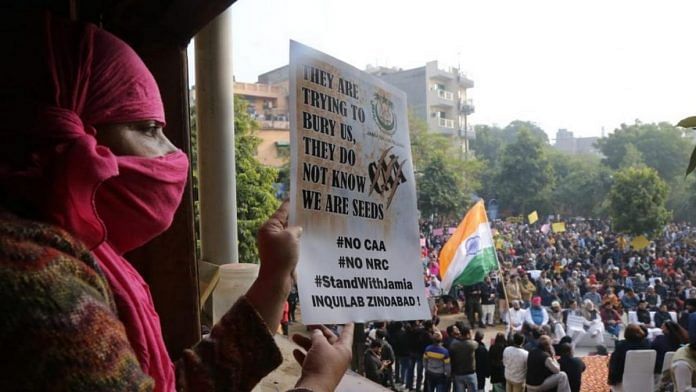New Delhi/Mumbai: Over two months after women from across different parts of the country thronged protest sites to dissent against the Citizenship Amendment Act (CAA), most of such protests in the national capital and Mumbai have now been called off due to the coronavirus pandemic.
At least five sit-ins in Delhi — Hauz Rani, Shahi Eidgah, Hazrat Nizamuddin, Jamia Millia Islamia (gate 7) and Azad market — have been “suspended temporarily” and organisers have appealed to the protestors to instead strategise online protests.
Similar statements released by the organisers of these protests over 22 and 23 March said the move shouldn’t be seen as “an end of the protest”.
“We are not calling off our protest. We appeal to other anti-CAA-NPR-NRC protests across the country to change to the mode of resistance that do not require public assembly (sic),” said the statement by Hauz Rani protestors.
However, protestors at Shaheen Bagh in the national capital have decided to continue their opposition to the contentious citizenship law, the National Population Register (NPR) and the proposed National Register of Citizens (NRC).
In Mumbai, too, the protest on half-a-kilometre stretch of Morland Road, which came to be known as ‘Mumbai Bagh’, was called off Monday, after Section 144 was imposed in Maharashtra.
Citing the importance of public health at a time when the government is battling COVID-19, the women — almost 5,000 in number — decided to go home.
“It will defeat the purpose of the peaceful agitation. We have come so far and we do not want it to become a bone of political contention. We will go home now and come back later,” a member of the Mumbai Bagh committee told ThePrint on condition of anonymity.
Also read: Transmission of coronavirus through newspapers, currency possible but unlikely: Experts
Online fight
The organisers of many of these protests have implored the protestors to “take the fight online”.
“We sat together through bitter winter nights. We sat together as our city was irresponsibly thrown into a spiral of violence… we made promises to each other to sit together till we were truly heard, until very recently when we began to learn and discuss the serious threats to public health posed by the COVID-19 pandemic,” said the Hauz Rani statement.
“While the pandemic means that we will not be able to assemble in public spaces, we have decided to take our opposition online and mark our resistance with other means — posters and hashtags on social media,” the statement added.
The Hauz Rani protest had begun exactly two months ago on 23 January.
“The protest is not over by any measure. We decided to get up for health concerns as well as for the benefit of the movement,” said one of the organisers who didn’t wish to be named.
“The police are never on our side, they are always looking to harass protestors. So we knew that with Section 144 imposed now, it’s best to get up before they look to intimidate us again,” the organiser added.
Hauz Rani protesters had earlier alleged police brutality on 23 February, a day before the Delhi riots began.
Similarly, the Jamia Coordination Committee, a group of Jamia students and alumni, called off their 24X7 sit-in protest outside gate 7 of the university. In its statement calling off the protest, the committee appealed to the government to withdraw CAA and NRC.
“We appeal to the central government to immediately suspend the exercise of NPR which is ongoing in many states, as all efforts by the government must be directed to fighting COVID-19 right now, not in dividing people on the basis of religion,” the statement said.
Shaheen Bagh stays put
The women of Mumbai Bagh have also decided to clear the road of all the protest paraphernalia such as the national flags, banners, photographs of B.R. Ambedkar, Chhatrapati Shivaji Maharaj, Mahatma Gandhi and Savtribai Phule, dotting the entire stretch.
“We will leave the place cleaner than it was,” said Mehr Ansari, a fashion designer who is part of the protest.
But even as Mumbai Bagh — originally inspired by Delhi’s Shaheen Bagh wraps up — the latter continues, albeit only symbolically.
Only five women sat in protest at the site Sunday, during the ‘Janata Curfew’ — a modus operandi that the protestors plan on continuing with. “With Section 144 now imposed, we will continue to protest with just 5 women sitting in the protest at a time,” Taseer Ahmed, one of the organisers, told ThePrint.
Nazia, a financial consultant with a multinational company who is part of the Mumbai Bagh protest said, “The protest by our sisters in Shaheen Bagh gave us strength. The protest against the NRC and CAA will restart later. At this moment our brothers and sisters across the country need our support. So we will sit at home.”
Also read: ‘Coronavirus isn’t going away in warmer months’ — US infectious disease expert busts myths



